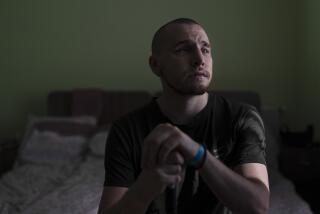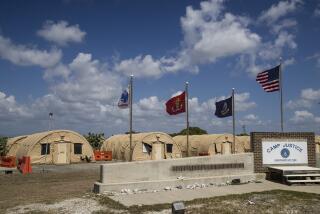Lessons of Vietnam for Soviets : U.S. Rehabilitation Team to Meet Afghan Returnees
- Share via
SAN DIEGO — Nineteen Americans who are skilled in the counseling and physical rehabilitation of Vietnam War veterans have been invited to the Soviet Union to address the problems of Soviet soldiers returning from Afghanistan, the head of a Seattle peace organization said Monday.
Diana Glasgow, director of citizen diplomacy projects for the Earth Stewards Network, said the trip had been approved by the Central Committee of the Communist Party and by the Soviet military leadership.
Glasgow said representatives of the Soviet government who requested the trip were interested in a delegation of experts in three main areas: prosthetic devices, especially those for the feet; wheelchairs, and psychological trauma.
The experts from the United States--including doctors, psychologists and engineers--will share ideas with counterparts from the Soviet Union and also work directly with Soviet veterans of Afghanistan, Glasgow said.
“It’s not accurate to say that these men will be counseling Soviet veterans so much as they will be meeting with them,” she added. “How much counseling can you do with someone you’ve just met? The point is to meet with veterans of the war in Afghanistan to describe programs and processes that worked for Vietnam veterans. We hope that some of those programs and processes also work for veterans of the Afghan conflict.
“(The Soviets are) particularly troubled about the social and psychological integration of returning war veterans. They want to know tons about post-traumatic stress syndrome.”
Consequently, one of the “headliners” of the U.S. delegation, Glasgow said, will be Charles Figley, a Purdue University psychologist and Vietnam veteran currently heading a conference in London on post-traumatic stress syndrome.
Other Participants
She said other participants in the conference--scheduled for Sept. 25 through Oct. 9 in Leningrad and Moscow--include Jack Smith, director of the Cleveland-based Center for Stress Recovery, which deals with the problems of Vietnam veterans; Shad Meshad, head of the Vietnam Veterans Aid Foundation, which is based in Los Angeles; and the Rev. William Mahedy.
Mahedy is the Episcopal chaplain at both Cal State San Diego and UC San Diego, and the author of a book, “Out of the Night: The Spiritual Journey of Vietnam Vets.”
“I don’t know what the parallels between Vietnam and Afghanistan will be, but I can suspect,” Mahedy said. “In the last few years, we’ve found problems not just among Vietnam vets, but veterans of all wars. I’ve dealt with veterans of World War II, Korea, even the Spanish-American War. Vietnam really opened up a can of worms, and what it tells us is something we should have known all along--that war is a ghastly business.”
Glasgow said, “This is a first, and it’s amazing that it’s even happening. Obviously, this--doing battle--is at the heart of the issue for Soviets and Americans. Furthermore, the Soviets have been touchy about comparisons between Vietnam and Afghanistan. Very touchy, in fact. Generally, they despise the comparison.
Points of Similarity
“But one very clear comparison is undeniable. Men in both wars dealt with blood and death and returned to civilian populations that had no idea, no understanding at all of what they’d experienced. It created tremendous psychological difficulty for Afgantsi (Soviet veterans from the war in Afghanistan), just as it did for Vietnam vets.”
The war in Afghanistan has created conflict within the Soviet Union, just as the Vietnam War created divisiveness in America. Moscow recently announced that half of its more than 100,000 troops in Afghanistan would be withdrawn as part of an agreement reached in April. Glasgow feels that U.S. Vietnam veterans are well equipped to understand the feelings Soviet soldiers are bringing back from Afghanistan.
One member of the U.S. delegation, she said, will be a Vietnam veteran whose appearance was specifically requested after he wrote a letter to Soviet leader Mikhail S. Gorbachev.
“He’s a (recovering) drug addict and alcoholic,” she said. “He wrote a very passionate letter, saying what the experience of war had been like for him. Obviously, somebody was moved enough by the letter to ask that he be included. Whether it was actually Gorbachev, I don’t know.”
Glasgow described her organization as an 8-year-old “non-religious, nonpolitical, nonprofit educational corporation.” She said it had sponsored a delegation of Soviet children from Siberia, who visited the United States in 1986. She said it also hosted periodic exchanges between children in Northern Ireland and the United States.
More to Read
Sign up for Essential California
The most important California stories and recommendations in your inbox every morning.
You may occasionally receive promotional content from the Los Angeles Times.










